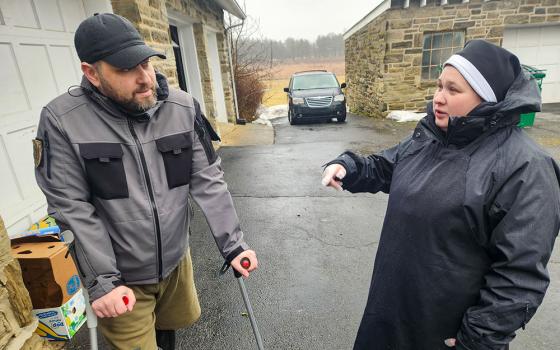Sr. Joan Chunkapura pioneered her ministry among addicted people in 1987 as a new mission of her congregation, Medical Mission Sisters. She continues to work in the same field, especially among young people affected by drug abuse and alcoholism. (Thomas Scaria)
Teachers noticed Theresa* behaving strangely as she started the second of her four-year engineering course in the southwestern Indian state of Kerala. The studious student turned pale and frequently skipped classes, ignored studies, and moved with a few select friends.
The teachers suspected she was into some addiction. Their probe revealed that Theresa had procured drugs from a saloon where she worked part time. The saloon owner, a woman, had introduced her to the drugs.
They then referred Theresa to a Catholic nun who works with drug users in Kottayam, a major town in Kerala.
Theresa "was fortunate to get help at the right time and she could recover," said Sr. Joan Chunkapura, a member of the Medical Mission Sisters who treated the young woman for her addiction to Tidigesic, an opioid synthetic drug.
After more than six months of intensive coaching, counseling and treatment, Theresa was back in classes as a reformed person.
Chunkapura, who has worked in the de-addiction field since 1987, is among Catholic nuns from various congregations engaged in saving India's young people from addictions to substance and alcohol abuses.
One of the nuns is her own elder sister in the same congregation: Sr. Lilly Chunkapura, who operates from Bengaluru, capital of the neighboring state of Karnataka, for a drug-free world.
Sr. Joan Chunkapura's elder sister, Sr. Lilly Chunkapura, also a Medical Mission Sister, addresses children of a government school in Kolar Gold Fields, where she founded Treatment, Rehabilitation and Education of Drug Abuse, or TREDA, in 1990 to cater to drug users from Bengaluru. (Courtesy of Lilly Chunkapura)
The elder sister collaborated with the Carmelites in 1990 to open a de-addiction center at Carmelaram (garden of Carmel), a suburb of Bengaluru.
Lilly Chunkapura told GSR that she could reach out to several villagers as well as young workers of corporate firms in Bengaluru with treatment and prevention services. "Even I could notice an increase in substance use disorder among young people these days," she added.
Joan Chunkapura also said the number of young people turning to drugs increases every year, and "our treatment facilities cannot address even 5% of them."
The latest World Drug Report released on June 26 presents an alarming increase of women and youth among drug users.
The report, published by the United Nations Office of Drugs and Crime on the occasion of the International Day against Drugs and Illicit Trafficking, indicated that cannabis use among the youth has increased wherever it was legalized, posing health and humanitarian threats through its consumption and dealing.
According to the report, around 284 million people used drugs worldwide in 2020, a 26% increase over the previous decade.
The report lists India as the top user of opium in the world.
Sr. Joan Chunkapura stands in front of the Medical Mission Sisters' Ayushya Center for Healing and Integration, near Kottayam. Ayushya, meaning "vitalizing," mostly caters to mental health services and indigenous healing services such as Reiki, Pranic healing, counseling and psychotherapy. (Thomas Scaria)
Theresa was first treated in 2019 at Ayushya Center for Healing and Integration, owned by the Medical Mission Sisters, near Kottayam. Later, the young woman was admitted in a drug rehabilitation center called the Total Response to Alcohol and Drug Abuse, or TRADA, which Joan Chunkapura co-founded in 1987.
Joan Chunkapura, who is in her late 60s, said by the time Theresa came to her, she had already introduced eight of her friends to drugs.
She recalled several such stories of girls who became drug peddlers after getting addicted.
She cited a news report about Leena*, a young woman who came to Kochi, Kerala's commercial hub, for a job interview on June 27. She was found unconscious in a small hotel at the time of interview. Police said she was intoxicated with a psychoactive substance.
In another case, Alphonsa*, a medical student, was caught hiding a synthetic hallucinogen drug in her undergarments, while traveling pillion with her boyfriend en route from Bengaluru to Kerala.
The two were among 18 young women arrested in Kerala in the past six months for possessing illicit drugs for sale. Most of them were also reportedly addicted to the drug they peddled.
Sixteen of the arrested were studying professional courses such as medicine and engineering.
Advertisement
Many start using drugs for fun and adventure, "but soon, it leads to addiction and legal offenses," Joan Chunkapura said.
Often, drug lords target girls as carriers to evade police checking. "In the process, they get addicted, too," she told GSR at the Ayushya Center.
These young women are often sexually abused, mentally harassed and emotionally blackmailed, "so that they remain in their trap."
She said most young drug users are not criminals or villains but victims of drugs rackets. "They need treatment, not prisons."
Joan Chunkapura blamed lack of intimacy at homes and an absence of fellowship in churches for the increase in cases of addiction among the youth. "They seek solace in drugs," she explained, as dysfunctional families and careless lifestyles often lead young people to drugs. Theresa's parents, she pointed out, divorced when she was a child.
Sr. Joan Chunkapura attending a client through online counseling, a practice she started during the pandemic. (Thomas Scaria)
The church has failed in "listening to youngsters" before they turn to intoxicating substances, she lamented. "A major part of our sermons and communications in the church are about donations, infrastructure building, and charity projects," Chunkapura said.
Young people seek intimacy, identity and a sense of belonging before trying their first dose, "but we are busy building rehabilitation centers to receive them at their chronic stage," she said.
Several youth she has treated were Christians, who generally showed an aversion to the church life and rituals.
"I feel good when some people recover from addiction, but feel frustrated when double the number turn to drugs every day," Chunkapura said, adding that treatment is not an answer to the growing problem. "We should work for prevention rather than cure."
She said it is useless to tell young people not to do drugs "unless we help them find a meaning in life through empathetic listening."
She also noticed certain reluctance in the church to get involved with anti-drug campaigns, despite being active in campaigns against alcohol. Many rehabilitation centers in southern India are afraid to treat drug users or are ill-equipped to handle such cases, largely because of the ties between drugs and crime, she added.
Apostolic Carmel Sr. Maria Jyotsna, a teacher by profession, has conducted de-addiction camps for alcohol dependents since 2002. Here she is at her last camp, held in Mangaluru in April 2022, leading a therapeutic session for patients. (Courtesy of Maria Jyotsna)
The drug lobby "is more powerful than the church or political systems" and the only way to save our children is to keep them closer to the church and families, she said.
She cited the cases of Catholic nuns who were killed by drug lords in India.
Srs. Sylvia D'Souza and Priya J. Devasia Kudakassery — both Franciscan Sisters of St. Mary of Angels — were found murdered Nov. 16, 1990, at Snehasadan ("Abode of Love"), a home for street children in Jogeshwari, a suburb of Mumbai. The probe revealed that this murder was related to drugs.
Joan Chunkapura said she accidentally entered the field of drug rehabilitation when she was doing her master’s course in clinical psychology at Delhi University in 1986. She noticed some students were already taking drugs.
"My roommate from Botswana was one of them, and I have seen how she struggled with drugs," she recalled. This led her to research in drug abuse as part of studies.
When she returned to Kerala after studies, she joined a temperance movement for prevention campaign, but eventually went into treatment sector by co-founding TRADA with the ecumenical council in the state.
"Since then, I have never turned back from my mission among drug and alcohol users," said the nun who has traveled across Kerala to spread awareness on addiction.
Lilly Chunkapura said her younger sister's work in Kerala inspired her to start the Bengaluru center. Initially hers was an extension of the Kottayam center, but eventually it grew as one of the most known rehabilitation centers in Bengaluru, where she also developed an HIV/AIDS intervention program.
The elder Chunkapura opened an outreach center to treat alcohol and drug users at the Kolar Gold Mines, about 60 miles east of Bengaluru.
Other congregations are also involved in the de-addiction ministry, mostly among alcoholics.
Apostolic Carmel Sr. Maria Jyotsna, a teacher, started working with alcoholic parents of some students and, since 2002, has organized therapeutic camps for them.
Bethany Sr. Anna Maria, secretary of her congregation's social works, said one of her target groups in Mangaluru was migrant laborers among whom alcohol addiction is rampant.
"We did not manage a drug treatment center but coordinated with other centers to admit, treat and rehabilitate them," she said.
Sister Pius, a senior Bethany nun in her 80s who has worked among alcohol and drug dependents for several years, said the addicts are "very helpless and hopeless, and they require our support and care."
"Social stigma has isolated them from the mainstream society," she said. "And if we also ignore them, who else will?"
*Names have been changed to protect identities.





